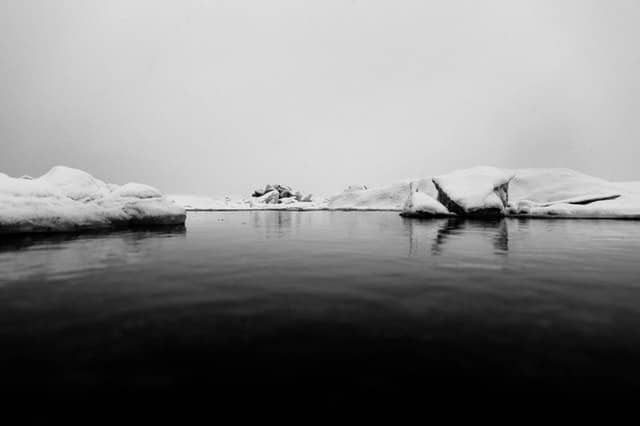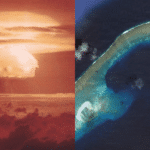With climate change comes loss and “ecological grief”
By Michaela Cavanagh | January 11, 2019
 Melting ice in black and white. Credit: Little Visuals from Pexels.
Melting ice in black and white. Credit: Little Visuals from Pexels.
Editor’s note: This story was originally published by Undark. It appears here as part of the Climate Desk collaboration.
When I called Courtney Howard, one of the authors of the recent Lancet Countdown 2018 Report on health and climate change, she was Christmas shopping during a pit stop in London on her way to the 24th United Nations Climate Change Conference in Katowice, Poland.
As she picked out ballet shoes for one of her young daughters, we discussed her work on the mental health impacts of climate change. She recounted to me the moment in her own life when climate change’s bottom line really sunk in. She was at home with her daughter doing some mental math: Yellowknife, the capital of Canada’s Northwest Territories, where she lives, was already 2.5 degrees Celsius warmer than it was in the 1940s, and the Intergovernmental Panel on Climate Change (IPCC) had recently reported that average global temperatures were on pace to warm another half degree or more by 2052. The warming would be irreversible in little more than a decade — well within the lifetime of her children. She wound up on the floor, wrapped around her daughter in the fetal position.
The impact of climate change on our physical world has by now been made clear and manifest to anyone paying attention: Rising sea levels and increasing temperatures have begotten wildfires, drought, tsunamis and heat waves, which have wrought unprecedented devastation. The impact of climate change on our internal worlds, though, has gone relatively unstudied. But a growing body of evidence demonstrates that climate change and its effects are linked to elevated rates of depression, anxiety, suicidal ideation, post-traumatic stress, and a host of negative emotions including anger, hopelessness, despair, and a feeling of loss. Researchers have dubbed these feelings “ecological grief.”
In a briefing for Canadian policymakers released in conjunction with the Lancet Countdown, Howard and her colleagues honed in on ecological grief, eco-anxiety, and something called solastalgia — a form of homesickness one experiences while still at home. Grief and mourning are natural responses to the scale of ecological loss we’re living through. Research shows that the sixth mass extinction is underway, and the World Health Organization named climate change the single greatest threat to global health this century.
Ecological grief is the grief that’s felt in response to experienced or anticipated ecological loss. It may arise due to acute environmental disasters. For example, one in six survivors of Hurricane Katrina met the criteria for post-traumatic stress disorder, and crop-damaging heat waves have been shown to lead to increased suicide rates in India. But grief can also stem from stress and anxiety associated with slow, creeping changes in one’s environment — feelings that many of us are experiencing as the winters become uncannily warmer and extreme weather events become more frequent.
Communities whose livelihoods and ways of living are inextricable from their natural environments, though, are on the frontlines of the crisis. In the Inuit communities of Nunatsiavut, located in the north of Canada’s most easterly province, Newfoundland and Labrador, temperatures are warming twice as fast as in the rest of the world. That has led to diminishing ice cover, shorter winters, and unpredictable weather. Like other public health challenges, the burden of climate change’s mental health impacts falls primarily on groups that are already vulnerable. The losses these communities suffer extend to every corner of their lives, and they’re unending, says Ashlee Cunsolo, the director of the Labrador Institute of Memorial University and another contributor to the recent Lancet report. The land — or ice — is literally shifting beneath their feet and before their eyes. The attendant grief these communities experience is similarly amorphous and ubiquitous.
The changing landscape brings food insecurity, post-traumatic stress disorder, population displacement, and trauma. There are no roads in or out of Nunatsiavut’s Rigolet, the southernmost Inuit community in Canada. The town is accessible by ice road, by plane, or — during the summer months — by ferry. In recent years, the ice has started to form a month later and melt a month earlier, says Derrick Pottle, a hunter and commercial trapper. And when there is no ice, community members have nowhere to go. Without the ice road, “you’re trapped — even if you wanted to get out you couldn’t.” For Pottle and the rest of the community, the sea and the land are “our highways, how we move around, how we get out to harvest, and how we connect to the land.”
Historically, the Inuit have depended on their natural environment for survival. To lose it is to lose not only the ability to visit friends and family, but also the ability to provide for one’s family by hunting, fishing, and foraging. The land is also foundational to a sense of well-being and belonging, contributing to people’s ability to live their cultural lives in a healthy way. To watch helplessly as the landscapes, ecosystems, species, and places that carried collective meaning become unrecognizable before your eyes is painful. Community members in Rigolet report feelings of fear, anxiety, sadness, anger, frustration, and hopelessness. They worry about what the future will bring for themselves and their children, and about what future environmental changes will mean for their way of life. These intense negative emotions can lead to additional mental health burdens, such as increases in drug and alcohol use, domestic violence, and suicide.
Ecological loss can also lead to a crisis of culture and identity. In the 2014 documentary about climate change in Rigolet, “Lament for the Land,” an existential question is posed: “Inuit are people of the sea ice. If there is no more sea ice, how can we be people of the sea ice?” This kind of mourning is what Cunsolo calls disenfranchised grief: a grief that isn’t publicly or openly acknowledged. When we grieve the loss of a person, we come together with other people and perform rituals to work through these elements of grief. But when it’s the loss of place, or the degradation of a body of water, or when a species collapses, there are simply no rituals in place for processing the loss.
The isolated ecological grief of the Inuit could soon transform into collective mourning, as large expanses of the planet become uninhabitable and more of us begin to experience the loss of our environments as we knew them. As Cunsolo and Howard continue to research ecological grief, they’ve both found that after they share their findings in public, there’s often a deluge of people who come to them to share their experiences of stress, anxiety, depression, and hopelessness in the face of our changing climate. Research like theirs quantifies the psychological toll of climate change, giving policy makers and health professionals the evidence they need to account for it as part of the human cost of global warming. Ecological grief is not new, but there’s power in being able to name it, and there’s relief in being able to share it.
As climate change marches forward, the tangible mental health effects of ecological grief will mount: loss of work hours, increased costs and burdens on health systems, and untimely death. But grief can either paralyze you or galvanize you. For years, emotion had no seat at the table in climate discussions, but the language of ecological grief adds weight to the science, statistics, policies, and politics of climate change. It makes it clear what is at stake — and what’s at stake are our lives as we know them.
By beginning to pay attention to these intangible losses, we can expand the narrative of climate change and find ways to support one another, encourage action, and create healthy communities. At the end of our call, Howard, nearly done with her shopping, gave me a prescription to do just that: Get outside for some fresh air, spend time with friends and family, and spend 20 minutes a day taking action against climate change.
Together, we make the world safer.
The Bulletin elevates expert voices above the noise. But as an independent nonprofit organization, our operations depend on the support of readers like you. Help us continue to deliver quality journalism that holds leaders accountable. Your support of our work at any level is important. In return, we promise our coverage will be understandable, influential, vigilant, solution-oriented, and fair-minded. Together we can make a difference.
Keywords: Climate change education, climate change, climate exiles
Topics: Personal Essay















For some time now I have wondered if I was depressed about the awful state of all things planetary – but I kept thinking ‘No, this isn’t depression. This is how I felt when my husband passed away. This is grief. This is despair. Combined with anger that something more has not been done. It is some comfort to know others grieve with you. As to the 20 minutes a day taking action against climate change – for sure I will be doing that in a much more active way. I have spent a bit of time looking at how… Read more »